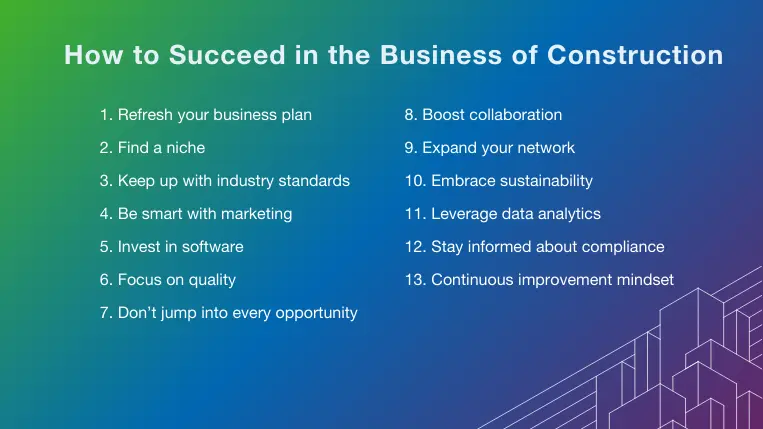10 mins read
13 Tips & Best Practices to Succeed in the Business of Construction

Construction, a $12 trillion industry, is a critical component of the world’s economy that continues to expand. The industry’s growth and diversity present nearly unlimited opportunities for contractors and other businesses to establish successful brands.
Despite a wealth of opportunities, the challenges inherent to everything from hiring and onboarding to sales and marketing can curtail the growth of even the most innovative and talented organizations. Success in the construction business requires a focus on quality and continuous improvement that embraces new tools, trends, and practices.
How to Succeed in the Business of Construction

There are no ironclad rules for how to run a construction company. However, many of the most profitable, respected, and growth-oriented businesses share common traits that, taken together, help lay out a roadmap for success. As they cultivate a highly skilled and stable workforce, create a clear company vision, and maintain a commitment to customer satisfaction, every construction business can improve its long-term prospects by adhering to a few basic principles.
1. Refresh your business plan
A business plan can be much more than a checkbox activity. The best business plans are living documents that reflect the organization’s latest goals and describe how they will be achieved. This might include services offered (now and in the future), target markets, pricing structures, and plans for integrating new software and digital construction technologies, like Building Information Modeling (BIM) or aerial drones, into the organization.
A well-written business plan should also encompass the monetary aspects of the business, including expense management and revenue goals, along with a competitive analysis that focuses on company strengths, weaknesses, and opportunities relative to the competition.
2. Find a niche
To stand out in the sea of construction business competition, each company should spend time defining what it does best and how these unique skills and strengths might help it attract clients or expand into new markets. For example, a flooring contractor with expertise in hardwood resurfacing might leverage the experience of its staff to expand from small residential projects into more lucrative industrial renovations. Businesses lacking a specialty might consider a strategy change to fill a market void.
3. Keep up with industry standards
The business of construction is closely tied to many standards and regulations related to building codes, worker safety, quality control, construction risk management, and technology implementation, just to name a few. Staying current with these standards helps prevent roadblocks that can stall progress and deter current and future customers. Important standards to stay informed on include:
- ISO 9001 International quality management system standards
- Relevant OSHA standards for building codes and safety regulations
- Environmental standards, including ISO 14001 and local laws
- Leadership in Energy and Environmental Design (LEED) standards for sustainable building designs
4. Be smart with marketing
The most successful companies realize brand marketing is essential to their growth strategy. The internet has layered social media and search engine optimization (SEO) into multi-channel marketing plans, and these new tools present opportunities to use marketing dollars wisely and grow the business organically.
In the construction business, referrals and testimonials from satisfied customers can become the most valuable marketing tools of all. This social proof can be woven into websites, Email campaigns, and advertising materials as part of an overall strategy to attract new customers.
5. Invest in software
The scope and diversity of modern construction projects make advanced software essential for companies of all sizes. While civil engineering and architectural firms benefit from revolutionary BIM management software to move core processes into the virtual realm, smaller businesses gain a competitive advantage from software designed to improve cost estimation, communication, and project management in construction projects.
RIB Software has created a full suite of construction solutions to address the challenges of today’s industry, including RIB BuildSmart for next-level cost management and accounting, RIB CostX for seamless quantity takeoff and estimation from either 2D or 3D files, and RIB SpecLink for centralized specification management and collaboration, among many others.
6. Focus on quality
Speed, efficiency, and competitive pricing are valuable metrics, but quality may be the most important factor in the highly competitive construction business. A focus on quality ensures projects meet specifications and safety standards with minimized rework or delays. These results lead to satisfied clients, positive word-of-mouth, and repeat business. A reputation for consistent high quality will often allow companies to submit higher bids and still win contracts based on reputation.
7. Don’t jump into every opportunity
As you learn how to grow a construction business, staying busy might seem important since you must keep workers engaged and revenue flowing. This tendency makes it hard to be selective with bids and projects, but pursuing too many opportunities can stretch resources too thin or move the business too far from its comfort zone, ultimately leading to poor performance and long-lasting damage to its reputation. Opportunities should be carefully selected based on a combination of fit and potential profitability; professional bid management software can help evaluate and select the best bids for your business.
8. Boost collaboration
Collaboration between contractors, clients, construction project managers, and workers has been emphasized in recent years, and rightfully so. Collaboration and real-time data sharing help to improve efficiency, reduce errors, and overcome the silos and delayed communication processes that can plague layered and complex industries. Clearly defining team roles and responsibilities is important in improving collaboration in construction projects by minimizing confusion and miscommunication.
9. Expand your network
Relationship-building and networking allow businesses to evolve and expand by meeting potential clients, hearing about new opportunities earlier, and exchanging ideas with owners of similar businesses. Construction networking happens organically when different businesses and specialties collaborate on a successful project. Still, the conferences, meetings, and events offered by many trade organizations can accelerate network-building.
10. Embrace sustainability
With the building industry responsible for nearly 40% of all global carbon emissions and a similar proportion of total energy consumption, sustainable construction practices are becoming popular for many clients. Early adoption of green practices like water conservation, waste reduction, and the use of eco-friendly building materials gives businesses a competitive edge over competitors who are slower to adopt these green practices.
11. Leverage data analytics
Data management and data analysis are becoming part of nearly every industry with the advent of AI and machine learning (ML), and the business of construction is no exception. Advanced data analytics are used to predict the cost, integrity, and sustainability of BIM designs, and they can also be leveraged to create more accurate schedules and identify potential safety risks. These capabilities help to improve the efficiency and profitability of growing companies. To leverage their data effectively, businesses must invest in innovative construction analytics software to visualize key information in real-time and make strategic, data-driven decisions.
12. Stay informed about compliance
Keeping up with the latest industry standards and regulations helps businesses stay in compliance and avoid fines, legal action, and increased insurance premiums that can hurt the bottom line and the company’s reputation. Construction software can make compliance easier by providing complete libraries of current standards, compliance checklists, and a centralized location for the permits, licenses, inspection reports, and safety certifications that demonstrate compliance.
13. Have a continuous improvement mindset
Keeping up with industry standards, incorporating data analytics and other advanced software tools, and adopting sustainable building practices are all examples of the continuous improvement mindset found in many successful businesses, especially the ones following lean construction principles.
Continuous improvement also requires a willingness to review past failures (and successes) and brainstorm new ways to improve safety, quality, and efficiency by adapting working methods or adopting new tools and technologies. This self-reflection and openness towards new ideas ensure that even the most successful businesses are moving forward rather than standing still.
Conclusion
Many common traits are found in the most successful and dynamic businesses in the construction industry, but no two companies are alike. Each requires its own specialized toolkit to suit its industry niche, culture, and goals. RIB Software has developed innovative construction software solutions for every process and specialty, from bid leveling and takeoff to project and resource management. Like our customers, we have adopted a continuous improvement mindset to ensure the latest trends and features are embedded within our solutions.
Join the 23,000 companies in 100+ countries who have trusted us as their digital transformation partner, and get your free demo for RIB’s toolkit today!
Most Recent
10 mins read
11 mins read
11 mins read
10 mins read
Blog Categories

Ebook











